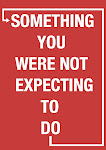Sunday, 2 May 2010
EXHIBITION 24 APRIL - 1 MAY
For Random Acts of Art three artists, who are known for placing an emphasis on social exchange in their artistic practice, were commissioned to develop new work over the course of a two-month residency at the gallery.
Artists Volkhardt Mueller, Lady Lucy and Amy Feneck were asked to respond to the context of the West Quarter of Exeter and to collaborate with people who live or work in the area. Each of the final works on display in the exhibition are the result of this process of engagement.
LADY LUCY
Lady Lucy has an ongoing interest in the every day and a self-proclaimed fascination with other people’s lives. For Random Acts of Art she sent invitations to the residents of nearby housing estates Mermaid Court, Neptune Court and Wheatley Court to sit with her at her mobile portrait studio and be painted. The Court Portraits are the result of the encounters that ensued.
Snippets of the conversations that took place during the painting sessions are made public around the edge of the canvases, offering us some insight into the story of each sitter.
Lady Lucy’s social portraiture lies somewhere between social practice and object making. On this occasion the artist will be redistributing the paintings to the sitters at the close of the exhibition. This radical gesture emphasises that the overriding value of an artwork can lie as much in the process of making as in a physical body of work.
AMY FENECK
Epilogue is based on a conversation between the artist and Terry Timlett, a member of Exeter CND, about Terry’s political activism and his particularly ‘independent spirit’. The latter was a term Feneck heard used in association with the West Quarter and took as her conceptual starting point.
In the film we see an actor and Terry as himself re-enacting an edited version of the original words from the conversation. Following the artist’s direction, which can be heard from behind the camera lens, the performers constantly move in and out of character – a theatrical device utilized in the final epilogue of a play.
Through the layers of editing, the artist gives multiple voices to a series of memories, opinions and values and in doing so confuses the boundaries of reality and fiction. As the narrative is delivered we are reminded that not only memory but history and social conditioning play and important role in the scripting and editing of our lives.
VOLKHARDT MUELLER
Wearing a sandwich board to initiate conversations and collect memories from passers by in the area, Mueller led and recorded a number of interviews with numerous striking West Quarter characters.
He discovered that both unsolicited displays of performance and carnival were once characteristic of an area where arguably there is now little sense of public ritual or event.
Majorette Rehearsing is a utopian portrait of the built environment, which unfolds through ten trajectories. The long receding views, enabled by the digital technology, expand and alter the actual scene, acknowledging an act of public performance without ceremony. The majorette is Muller’s West Quarter archetype, a paradoxical figure of individual aspiration, community celebration and carnival.
Subscribe to:
Post Comments (Atom)
















No comments:
Post a Comment